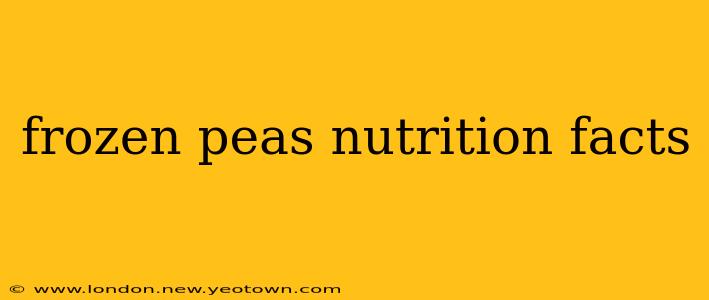Let's be honest, frozen peas often get overlooked. Tucked away in the freezer, they might seem like a simple side dish, a mere afterthought. But the truth is, these little green gems are nutritional superheroes, packed with vitamins, minerals, and fiber, all while being incredibly convenient. This deep dive into the nutritional facts of frozen peas will reveal why they deserve a starring role in your healthy eating plan.
What are the Nutritional Benefits of Frozen Peas?
Frozen peas boast an impressive nutritional profile. They're low in calories but high in essential nutrients. A single cup (about 140 grams) of frozen peas typically contains:
-
Vitamins: A significant source of Vitamin K, crucial for blood clotting and bone health. They also offer Vitamin C, an antioxidant protecting your cells from damage, and Vitamin A, supporting vision and immune function. A smaller amount of Vitamin B vitamins like folate (important for cell growth and development) is also present.
-
Minerals: Frozen peas are a good source of manganese, contributing to bone health and metabolism. They also provide smaller amounts of iron, potassium, and magnesium, each playing vital roles in bodily functions.
-
Fiber: Peas are a decent source of dietary fiber, promoting healthy digestion and contributing to feelings of fullness, which can aid in weight management.
-
Antioxidants: Beyond Vitamin C, peas contain other antioxidants like carotenoids, which help protect against cell damage caused by free radicals.
Are Frozen Peas Healthier Than Fresh Peas?
This is a question that sparks many debates! The truth is, both frozen and fresh peas offer similar nutritional value. The key difference lies in the timing of freezing. Frozen peas are typically picked at their peak ripeness and frozen quickly, often within hours of harvesting. This rapid freezing process helps to lock in nutrients, potentially resulting in a higher retention of certain vitamins than peas that have spent time in transit and on supermarket shelves.
What are the Calories in Frozen Peas?
A serving of frozen peas (about 1 cup) is remarkably low in calories, typically around 62-80 calories. This makes them an excellent addition to weight-management diets. The calorie count can vary slightly based on the brand and preparation method.
How Much Protein is in Frozen Peas?
While not a primary protein source, frozen peas do contain a modest amount of protein, roughly 5-7 grams per cup. While not sufficient for building muscle on its own, it still contributes to your daily protein intake.
How to Incorporate Frozen Peas into Your Diet?
The beauty of frozen peas is their versatility. They're not just a side dish! Think about adding them to:
- Soups and stews: Add them near the end of cooking to retain their vibrant green color and texture.
- Salads: Their sweetness and crunch add a delightful element to any salad.
- Pasta dishes: Toss them in with your favorite pasta sauce for a boost of nutrients.
- Smoothies: Blend them into your smoothie for a hidden vegetable boost.
- Purees and dips: Blend them into a smooth puree for a healthy addition to dips or sauces.
Are Frozen Peas Good for Weight Loss?
Because they're low in calories, high in fiber, and packed with nutrients, frozen peas can be a valuable asset in a weight loss plan. The fiber helps keep you feeling full, reducing overall calorie intake. Remember that a balanced diet and regular exercise are crucial for successful weight management.
Are there any potential downsides to eating frozen peas?
While generally very healthy, some individuals may experience digestive discomfort if they consume large quantities due to their fiber content. As with any food, moderation is key. Also be mindful of sodium content if you're opting for pre-prepared mixes.
In conclusion, frozen peas are a nutritional powerhouse that deserves a place in your kitchen. Their convenience, affordability, and impressive nutrient profile make them a versatile and healthy addition to any diet. So next time you're planning your meals, don't overlook the humble frozen pea – it might just be the superhero your diet needs!

